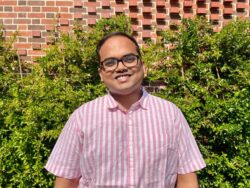Bridging communities and academia: a Student Sustainability Architect blog
Rishabh Bezbaruah is a Student Sustainability Architect, who has been working on a project within the Positive Impact Partners (PIP) programme. In this blog post he shares his journey throughout the role, reflecting on the impact it has had on his professional development and contribution to sustainability at the University of Leeds.

As I sit down to reflect on my time as a Student Sustainability Architect (SSA) at the University of Leeds, I am struck by the transformative impact this role has had on my academic journey and professional development. Currently pursuing an MSc in Data Science and Analytics as a Chevening-Adani AI Scholar, my involvement in the Positive Impact Partners (PIP) programme has offered a unique perspective on how universities can collaborate with local communities to address pressing sustainability challenges.
A Journey from India to Leeds
Before joining the university, my professional journey in India spanned four years across community development and public policy domains. This diverse experience with corporate, government, and multilateral organisations allowed me to delve into the design and implementation of large-scale National programmes. However, my role as a Student Sustainability Architect (SSA) at the University of Leeds introduced me to the impactful realm of localised collaborations between community organisations and academia.
Exploring the Landscape of Community-University Partnerships
As part of the PIP programme, which is a key component of the delivery team for the University’s Climate Plan’s ‘Supporting a Net Zero City’ Principle, I have explored how Community-University Partnerships (CUPs) can support communities in building their resilience against climate change impacts. A significant part of my role involved researching the challenges and best practices of existing CUPs focused on sustainability issues. This exploration has been instrumental in transforming PIP into a robust evidenced-based programme. The iterative discussions with my project supervisor, Dr Rebecca Brunk, allowed me to align my interests with the project goals, creating a truly collaborative and rewarding experience.
Developing Crucial Skills for the Future
The SSA role has been invaluable in helping me understand the UK work culture. The flexibility to balance this part-time position with my studies has allowed me to develop essential workplace skills while gaining practical experience in sustainability initiatives. This hands-on approach has deepened my understanding of the multifaceted nature of sustainability challenges and the importance of localised, collaborative partnerships in our fight against climate change.
The Power of Student Engagement in Sustainability
The Student Sustainability Architect projects and the broader PIP programme offer a unique opportunity for students passionate about making a difference. These initiatives provide real-world impact through projects that directly support local organisations and communities, allowing students to see tangible results of their efforts. They foster skill development in project management, research, and communication within a professional environment. Students can build valuable networks by connecting with researchers, community leaders, and sustainability professionals. Additionally, the projects encourage interdisciplinary learning, engaging with sustainability challenges from various angles and complementing academic studies with real-world applications. Lastly, these experiences offer career exploration opportunities, helping students discover potential paths in sustainability and community development across various sectors and roles.
For students considering involvement in these programmes, I cannot recommend them highly enough. The experience of working as an SSA has not only enhanced my academic journey but has also provided me with a clearer vision of how I can contribute to a more sustainable future.
As I continue my studies and look towards my future career, I am grateful for the opportunity to have been part of the University of Leeds’s commitment to sustainability. The PIP programme and SSA role have exemplified how universities can play a crucial role in fostering community resilience and driving positive change. For students seeking to make a meaningful impact during their time at the University, these initiatives offer an unparalleled opportunity to grow, learn, and contribute to a more sustainable world.
United Nations Sustainable Development Goals (SDGs)
We use the United Nations Sustainable Development Goals (SDGs) as a framework to guide our activity. Our work on Positive Impact Partners is linked to the following SDGs:
-
-
-
- Goal 4: Quality education
- Goal 11: Sustainable cities and communities
- Goal 17: Partnerships
-



-
